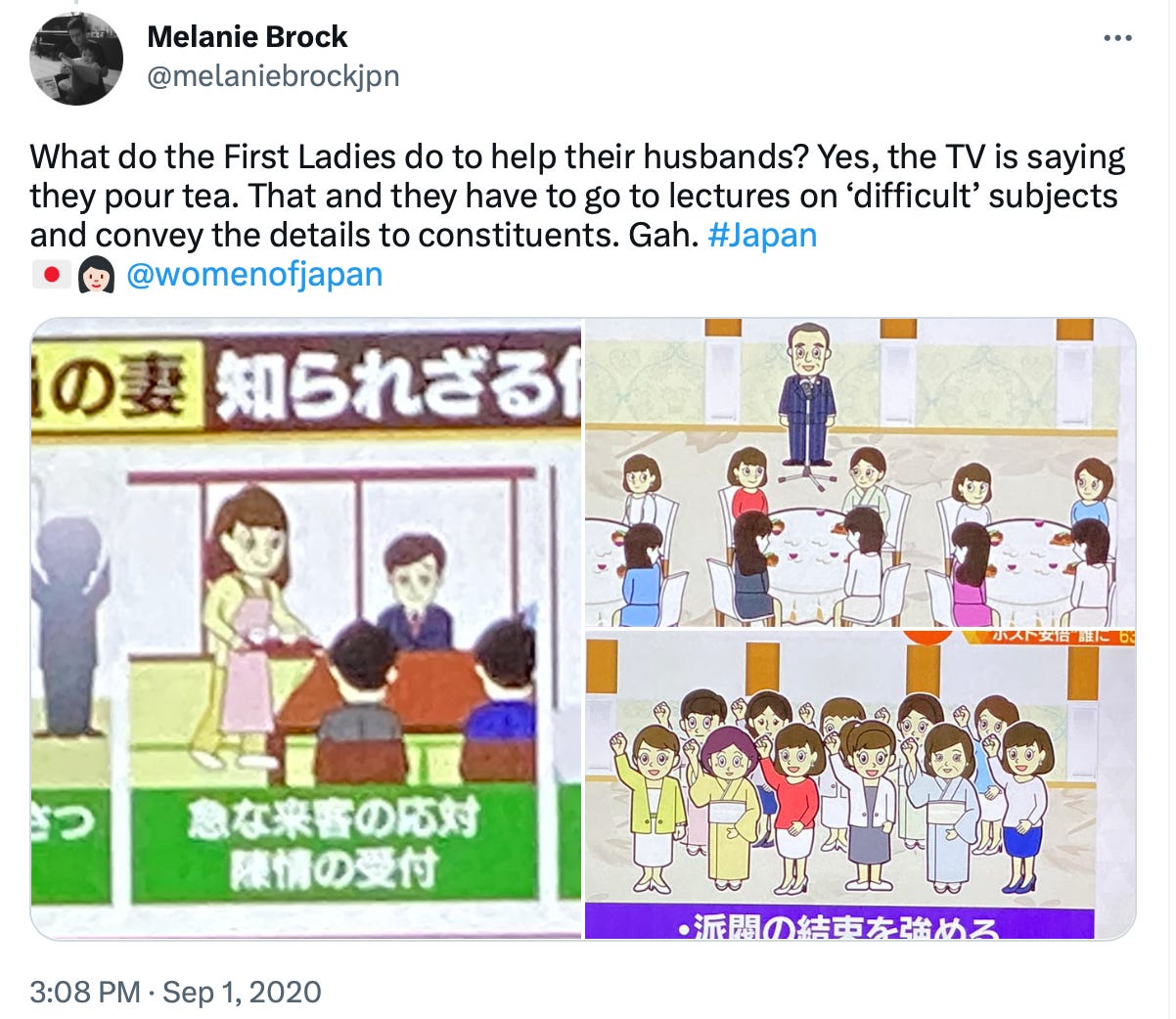Sanna Marin, political husbands, Japan polls: Everything you should know about women in politics this month
#WomenLead (Issue 138): Your monthly round-up on women in politics
Hello, and welcome to the April 2023 edition of #WomenLead!
A huge and warm welcome to all our new subscribers. We are truly thrilled to have you on board!
At #WomenLead, we track and highlight the world of politics from the perspective of women. Our aim is to amplify the work and voices of women political leaders, and also to sensitise readers to the many obstacles (both glaring and nuanced, the blatant and invisible) that women have to negotiate in routine ways across different layers in politics.
This is the first monthly (and revamped) edition of #WomenLead. You can access all past editions here.
To all those who wrote in saying they were missing our weekly mails, thank you. We are not going to lie - we did shed a tear or two after reading your affectionate messages 🥲. But we’re right here, with all the news and updates you need to get up to speed on all things #womeninpolitics!
Election Watch
Tracking women among candidates and winners
🇯🇵 Japan: In April, local elections were held in Japan. Women made up an “embarrassingly low” 15.6 percent of the candidates, in the words of The Mainichi newspaper (and we wholeheartedly agree!). But there was something to cheer about. Women made up 14 percent of those elected to prefectural seats and 22 percent of those elected to city assemblies, both record highs, according to The Asahi Shimbun.
🇬🇧 United Kingdom: Meanwhile, the UK is all set to elect local-level legislators on May 4. Important research by the Fawcett Society in the run-up to the polls has revealed that fewer than 5 percent of local councils in the UK have gender parity - 95 percent remain skewed with more men than women. Overall, women comprised over a third (36 percent) of local councillors. Will that change for the better next week? Let’s hope!
🇹🇷 Türkiye: Türkiye will hold general elections to elect its next set of national legislators and a new President on May 14. The list of those contesting for the top post is an all-male affair.
EŞİK, a platform that works on women’s rights, has raised concern over the lack of women and their poor placement on candidate lists of major political parties. Women comprise 17.4 percent of members in the outgoing parliament, data from the Inter-Parliamentary Union shows. Going by candidate lists and electoral predictions, their representation is likely to touch only 19.5 percent in the upcoming election, EŞİK estimates.
🇹🇭 Thailand: On the same day, Thailand too will hold general elections. Women comprise 18.4 percent of those contesting constituency-level seats, Thai PBS reported. Thailand follows a mixed-electoral system, where some candidates are elected directly through the first-past-the-post system, and others through party lists. Sex-disaggregated data for the latter is not available. There are nine women among the 63 running to be the next PM, but all eyes are on Paetongtarn Shinawatra, who has emerged as a favourite. Both her father and her aunt have served as PMs, and both were ousted by military coups. Read more about her here, and here.
Leaders
Updates about women leading countries
🇫🇮 Finland: Sanna Marin was voted out as Finland’s Prime Minister in the election held in March, results for which were announced early April. She is continuing to head a caretaker government until a new one is formed. Overall, 92 women were elected as MPs in the election, taking women’s share up to 46 percent in the Finnish parliament, data from the IPU shows.

With Marin no longer PM, the small share of women heading countries could shrink further. The Visual Capitalist published an infographic showing heads of state of countries around the globe. Take a look here, and try counting the number of women to know what we mean!
On-the-job Updates
Spotlighting women’s experiences in political office
“How do you get your husband to let you do this?”
“Are you in politics to meet a husband?”
These are statements that two women politicians in very different parts of the world have been asked. The first was asked by a male voter to Holly Richardson as she was contesting an election to be Republican legislative district chair in the USA, and the second was a question directed at Natasha Stott Despoja, who was elected to the Australian federal parliament in 1995 at the age of 26.
But guess who was really in a rush to become a husband? Mamun Shah Khan, a resident of a village in the Indian state of Uttar Pradesh, found himself a willing bride and got married within 45 hours after he found out that the council seat from his area would be reserved for women, India Today reported. He did it just in time before the applications closed. This dismal state of affairs where men try to rule by proxy is of course not new. For more context, you can read this.
So yes, if we really want to ask those husband-wife questions of our politicians, the least we can do is ask them right!
In a rather tragic irony, 11 women MPs in Uganda were detained by the police as they were on their way to protest police brutality, Reuters reported. The women claim that the police had used excessive force at various events organised by women legislators in their constituencies. The police (showing clear evidence of the claim!) arrested them for unlawful protest.
Thomas Tayebwa, Deputy Speaker of Uganda’s Parliament tweeted a strong condemnation of the arrests, pointing out that the women MPs were peaceful and unarmed. “Some are bleeding and for some, the clothes were torn,” he tweeted. “It was as if they were arresting terrorists.”
Change Brewing
Because the times, they are always a-changin’
“Women are significantly under-represented in Pacific politics. But they're pushing for change”, Marian Faa writes for ABC News
On Jiang Shengnan, the woman trying to change Chinese politics from the inside: Sixth Tone
“A small Japanese town sets new precedent for women in politics”: Bloomberg
Shout-out
A note of gratitude for those tracking gender gaps in politics
In this edition, we would like to give a big shout-out to Melanie Brock, founder of Women in Japan, for consistently shedding light on gender gaps in Japan’s politics.
Regular readers of #WomenLead know that Japan’s politics remains stubbornly male. While elections and other big updates do get covered widely in the international English press, Brock consistently uses social media to draw our attention to the wide gaps that persist in the more routine aspects of Japanese political (and public) life, such as political steering committees, the media’s focus on “first ladies”, women on banknotes, or manels on TV discussions. We have learnt a lot about the country through her posts. We hope you will too!
Reading List
The more one learns, there’s only more there is to learn
“The stubborn sexism of American politics”: Vox
“Women’s experiences of representation and marginalization in Morocco: Taking stock and outlining future trajectories”: Arab Reform Initiative
“Sexism: the price of being a female politician in Liberia”: Daily Observer
“How do crises affect women leaders?”: LSE Blogs
“92% of MLAs elected in past 25 yrs were men — what data shows about women’s representation in [Indian] politics”: The Print
That’s a wrap for April! Liked this edition? Then press the ❤️ button and show us some love! And please, please do share this with a friend or on your social media accounts. There’s frankly nothing quite like reader love and endorsement, so please keep it coming! Thank you!
Disclaimer: #WomenLead is a non-partisan newsletter produced in a personal capacity, and does not reflect any institutional affiliation/opinion. In case of any questions, please drop in a message at womenlead.project@gmail.com




